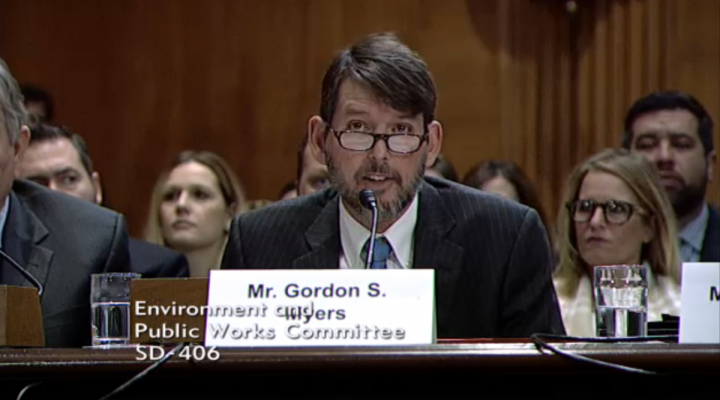
WASHINGTON, D.C. – North Carolina’s top wildlife official told a U.S. Senate committee this week that he supports the federal Endangered Species Act but agrees with those who say the law enacted in 1973 should be “modernized” with increased management authority at the state level.
Environmental groups, however, say “modernization” is a euphemism for rolling back protections and the Senate hearing on Wednesday was a step toward gutting or repealing the act.
Supporter Spotlight
Gordon Myers, executive director of the North Carolina Wildlife Resources Commission, testified Wednesday before the Senate Committee on Environment and Public Works, during the hearing on modernizing the act that was last amended in 1988. Myers said much had been learned since that time on conservation and recovery of listed species and “how to facilitate, not proscribe, private landowner involvement” in the process.
“We support the ESA but believe that it should be modernized to meet today’s restoration challenges,” according to the transcript of Myers’ testimony at the hearing.
Myers also serves as president of the Southeastern Association of Fish and Wildlife Agencies and he sits on the executive committee of the Association of Fish and Wildlife Agencies, or AFWA, of which all 50 states are members. Myers said his testimony also represented the views and positions of the associations and the AFWA committee.
Myers outlined a half-dozen “priority improvements” proposed by AFWA for modernizing the act. He said there should be more opportunities for state fish and wildlife agencies to take a more formal and active role in “all aspects” of implementing the act.
“States should be afforded the opportunity to participate in all implementation aspects of the ESA from listing decisions, to recovery plan development and conservation recovery efforts on the ground, to providing guidance to private landowners in the use of federal incentive programs that provide them more certainty, to decisions regarding down-listing and de-listing of recovered species,” Myers said during the hearing.
Supporter Spotlight
Myers said states also need more flexibility to manage species listed as threatened and endangered differently, and that a U.S. Fish and Wildlife Service rule enacted in the 1980s blurred the distinction between the two listing categories. He also said the listing process should be improved with new requirements for science-based recovery plans for listed species and a mandate for de-listing once habitat and population goals are reached.
There are 61 threatened and endangered species known to occur in North Carolina, according to the U.S. Fish and Wildlife Service.
Myers also noted that the act’s legislative history shows that Congress intended that states with qualified endangered species programs lead in the conservation and recovery of threatened species and receive federal funding to administer these programs, but no money was granted for that purpose.
“Unfortunately, this has created missed conservation opportunities to restore species by state experts who are closest to the species, understand the recovery needs, and have the community relationships necessary to achieve recovery,” according to the transcript of Myers’ remarks.
More constructive and collaborative efforts from interested stakeholders are needed to advance the conservation and recovery of species of interest, Myers said. “We all have an interest in recovering species listed under the ESA and together could do more if concerns and stakeholder interests were directly focused on habitat conservation and recovering listed species rather than redirecting limited federal and state fiscal resources away from on the ground conservation activities,” he said.
‘Great Success’
Defenders of Wildlife President Jamie Rappaport Clark also testified during the hearing, saying the act enjoys widespread public support and didn’t need to be fixed or modernized.

“Simply put, the Endangered Species Act works,” she said.
The act has achieved “great success,” Clark said, adding that only 10 listed species had been officially declared extinct during the act’s 44-year history. That amounts to a 99 percent success rate in preventing the extinction of threatened and endangered species, she said.
The act, however, has become a “lightning rod” for those who seek lessened environmental protection and regulation, she said. Talk of modernizing the act was a “euphemism” for undermining the law, she said.
“In just the past two years in this Congress, we’ve seen over a hundred bills proposed that all, without exception, would have weakened or undermined the act and its purposes,” Clark said.
Clark said the act had been improved by continuous administrative reforms that have made the act work better – both for the species it protects and for landowners and other stakeholders affected by its provisions.
Clark, former director of the Fish and Wildlife Service under President Clinton, said the most important thing Congress can do to improve the act’s effectiveness is to fully fund it.
“The current fiscal starvation must end,” she said.
Other Opinions
Groups supporting an overhaul of the act include the American Farm Bureau Federation, which represents the agriculture industry. The group says the act’s restrictions are especially harsh for farmers and ranchers.
“The (act) is one of the most far-reaching environmental statutes ever passed,” according to the Farm Bureau. “It has been interpreted to put the interests of species above those of people, and through its prohibitions against ‘taking’ of species, it can restrict a wide range of human activity in areas where species exist or may possibly exist. Furthermore, it allows private special interest groups to sue anyone who they allege to be in violation of the Act.”
The group says that less than 2 percent of all listed species have been removed from protection since the law was enacted in 1973.

James Holte, president of the Wisconsin Farm Bureau Federation, also testified during the hearing, saying the act fails to provide adequate incentives for conservation on farmlands and imposes broad regulatory burdens on agriculture.
“Reform of the (act) should include a focus on species recovery and habitat conservation that respects landowners and prioritizes basic human needs over those of endangered species,” Holte said. “Coordination with state wildlife agencies to leverage private, incentive-based conservation efforts can better achieve long-term conservation goals.”
Other groups, including the Center for Biological Diversity, a nonprofit conservation organization, say the hearing this week was just the latest in a series of attacks on endangered species protection. The center issued a statement that noted the hearing was chaired by Sen. John Barrasso, R-Wyo., who has a long record of voting against the Endangered Species Act.
“The clear intent of this hearing is to begin the process of gutting the Endangered Species Act,” Brett Hartl, the center’s government affairs director, said in the statement. “Senator Barrasso’s callous attack on this crucial environmental law is totally out of step with the strong majority of Americans who support the Endangered Species Act. Without the Act we wouldn’t have bald eagles, grizzly bears or many other wildlife species we all cherish.”
Barrasso said Wednesday at the outset of the hearing that, “The Endangered Species Act isn’t working today.”
Learn More
* Hearing begins about 17 minutes after start of video.







